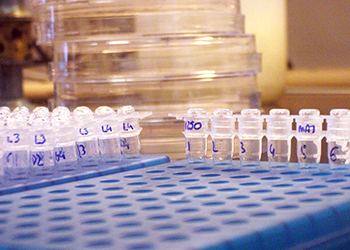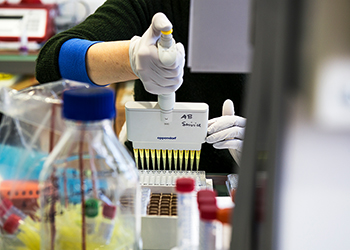
Lymphocyte Development and Leukemogenesis
Vera Martins
Research in the Lymphocyte development and Leukemogenesis Laboratory focuses on T lymphocyte development, both under steady state, physiological conditions, as well as in leukemia. T lymphocyte development occurs mostly in the thymus from progenitors of bone marrow origin in a process that involves high cellular turnover. The research team found that thymus turnover is regulated by cell competition. Specifically, the seeding of the thymus by ‘young’ hematopoietic precursors (with a short dwell time in the thymus) led to the clearance of the ‘old’ precursors (residing for longer in the thymus).
Importantly, cell competition is not cell autonomous, i.e., it is the presence of the young that induce the clearing of the old. Consistently, when no progenitors seed the thymus, i.e., if no cell competition took place, old precursors persisted in the thymus, self-renewed, and for some time gave rise to T lymphocytes. In other words, autonomously maintained thymus function. Nevertheless, while apparently beneficial for a short period, prolonged thymus autonomy led to aggressive T cell acute lymphoblastic leukemia with strong similarities with the human disease. The Lymphocyte development and Leukemogenesis Laboratory focuses on the identification of the cellular and molecular mechanisms governing cell competition in normal thymus turnover, and on the changes associated with the malignant transformation of T lymphocyte precursors as a consequence of impaired cell competition.
Publications
- Rafael A. Paiva, António G. G. Sousa, Camila V. Ramos, Mariana Ávila, Jingtao Lilue, Tiago Paixão, Vera C. Martins (2021) Self-renewal capacity of double negative 3 (DN3) early thymocytes preserves thymus autonomous function but compromises the β-selection checkpoint.. Cell Reports 35 (2):108967
- C. V. Ramos and V. C. Martins (2021) Cell competition in hematopoietic cells: Quality control in homeostasis and its role in leukemia.. Dev Biol 475:1-9
- N. L. Alves, A. Carvalho, K. Serre, V. C. Martins and M. Saraiva (2020) The Portuguese Society for Immunology (SPI): history and mission.. Eur J Immunol 50: 918-20
- C. V. Ramos, L. Ballesteros-Arias, J. G. Silva, R. A. Paiva, M. F. Nogueira, J. Carneiro, E. Gjini and V. C. Martins (2020) Cell Competition, the Kinetics of Thymopoiesis, and Thymus Cellularity Are Regulated by Double-Negative 2 to 3 Early Thymocytes.. Cell Rep 32:107910
- Ballesteros-Arias, L., Silva, J.G., Paiva, R.A., Carbonetto, B., Faísca, P., Martins, V.C. (2019) T Cell Acute Lymphoblastic Leukemia as a Consequence of Thymus Autonomy. J Immunol. 202(4):1137-1144
- Paiva, R.A., C.V. Ramos, and V.C. Martins. (2018) Thymus autonomy as a prelude to leukemia. FEBS J
- K. Krowiorz, J. Ruschmann, C. Lai, M. Ngom, T. Maetzig, V. Martins, A. Scheffold, E. Schneider, N. Pochert, C. Miller, L. Palmqvist, A. Staffas, M. Mulaw, S. R. Bohl, C. Buske, M. Heuser, J. Kraus, K. O'Neill, C. L. Hansen, O. I. Petriv, H. Kestler, H. Dohner, L. Bullinger, K. Dohner, R. K. Humphries, A. Rouhi and F. Kuchenbauer (2016) MiR-139-5p is a potent tumor suppressor in adult acute myeloid leukemia.. Blood Cancer J. 6:e508
- Rode, I., Martins, V.C., Küblbeck, G., Maltry, N., Tessmer, C., Rodewald, H.R. (2015) Foxn1 protein expression in the developing, aging, and regenerating thymus.. J Immunol. 195(12):5678-87
- Martins, V.C., Busch, K., Juraeva, D., Blum, C., Ludwig, C., Rasche, V., Lasitschka, F., Matitsky, S., Brors, B., Hielscher, T., Fehling, H.J., Rodewald, H.R. (2014) Cell competition is a tumor suppressor mechanism in the thymus.. Nature 509:465-470
- Luche, H., Rao, T.N., Kumar, S., Tasdogan, A., Beckel, F., Blum, C., Martins, V.C., Rodewald, H.R., Fehling, H.J. (2013) In vivo fate mapping identifies pre-TCRα expression as an intra- and extrathymic, but not prethymic, marker of T lymphopoiesis.. J Exp Med 210:699-714
- Martins, V.C., Ruggiero, E., Schlenner, S.M., Madan, V., Schmidt, M., Fink, P.J., von Kalle, C., Rodewald, H.R. (2012) Thymus-autonomous T cell development in the absence of progenitor import.. J Exp Med 209:1409-1417
- Martins, V.C., Boehm, T., Bleul, C.C. (2008) Ltbetar signaling does not regulate Aire-dependent transcripts in medullary thymic epithelial cells.. J Immunol. 181:400-407
- Benz, C., Martins, V.C., Radtke, F., Bleul, C.C. (2008) The stream of precursors that colonizes the thymus proceeds selectively through the early T lineage precursor stage of T cell development. J Exp Med 205:1187-1199
- Heinzel, K., Benz, C., Martins, V.C., , Haidl, I.D., Bleul, C.C. (2007) Bone marrow-derived hemopoietic precursors commit to the T cell lineage only after arrival in the thymic microenvironment.. J Immunol. 178:858-868

